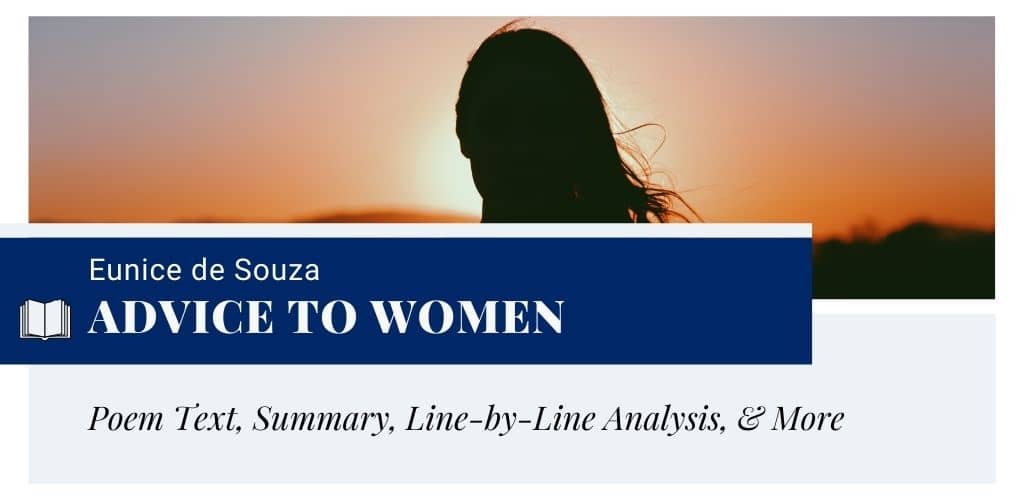Advice to Women by Eunice de Souza
“Advice to Women,” written by one of the important feminist poets of 20th-century India, Eunice de Souza, is a short pithy saying on the “otherness” of lovers. This piece is written in the form of advice to a woman who is on the brink of a relationship. Eunice’s humorous remark concerning the preparation of a heartless detachment revolves around keeping cats. In this piece, she shows the way a woman, internally weak and mentally dependent on her partner, is treated. The main theme of this piece taps on the “otherness of lovers.” She uses metaphorical language in order to portray this theme.
- Refer to the full text of “Advice to Women” below:
Advice to Women by Eunice de Souza Keep cats if you want to learn to cope with the otherness of lovers. Otherness is not always neglect — Cats return to their litter trays when they need to. Don't cuss out of the window at their enemies. That stare of perpetual surprise in those great green eyes will teach you to die alone. - from Selected and New Poems (1994)

Summary
“Advice to Women” begins in the manner of advice from an experienced heart, adept in coping with break-ups. She has mentally become stronger and her heart has learned the art of moving on. In this poem, she satirizes the way lovers betray their weak, other halves. According to her, it is always better to keep a cat before one gets ready for the rollercoaster ride of a relationship. It always comes back for food, nothing else. Likewise, a man wanders in the need for sexual food from his partner. In the parting lines, the poet shows the cold, detached look of men that teaches women to die alone.
Structure & Form
This poem is written in free-verse as there is not any specific rhyme scheme or meter. The overall poem consists of twelve lines. de Souza uses end-stopped lines to make her points. Her lines sound like a series of advice to women concerning the art of coping with the trauma of romantic detachment. She talks directly with readers from the perspective of a third-person speaker. Besides, the amalgamation of short and long lines creates an artistic effect inside the text.
Poetic Devices & Figurative Language
Eunice de Souza uses the following poetic devices in order to make poetic thoughts more effective and appealing to readers.
- Enjambment: It occurs throughout the text. Eunice uses this device to internally connect the lines. It also creates a suspenseful transmission between the lines. For example, it is used in the first three lines.
- Metaphor: The poem begins with a metaphor of “cats”. It is an implicit reference to selfish lovers. There is another metaphor in “litter trays”. Here, a woman’s body is compared to a litter tray.
- Alliteration: It occurs in “Keep cats”, “to learn to” and “great green”. Readers can also find assonance in “Otherness of lovers”.
- Epigram: The overall poem is a short pithy saying and the sense stays with the readers. The use of epigrammatic ideas can be found in the lines such as “Otherness is not always neglect”.
- Irony: It occurs in “Cats return to their litter trays/ when they need to.” Here, the poet refers to the selfishness of lovers.
Line-by-Line Analysis & Explanation
Lines 1-3
Keep cats
if you want to learn to cope with
the otherness of lovers.
The poem “Advice to Women” begins with a short, prickly remark: “Keep cats”. Readers can also feel the harsh “k” sound buzzing in the phrase. In this way, de Souza’s persona tries to be straightforward from the very beginning. She does not want to kindly comfort the women who failed to understand the treacherous hearts of their lovers.
de Souza tells them to pet cats if they badly need to learn the art of faring with a break-up. She compares the heartless attitude of the lovers to the idea of “otherness”. Otherness is the quality of being different. So the phrase “otherness of lovers” refers to the change of mind when men find a better-looking material in exchange for an old, worn-out piece placed carelessly in their attic.
Lines 4-6
Otherness is not always neglect –
Cats return to their litter trays
when they need to.
In these lines, the poetic persona makes another pithy remark. She ironically says that the otherness of lovers does not always convey a sense of neglect. It is not that the heartless lovers do not care for their partners. They do care for a specific need only. Readers can easily apprehend what this need can be.
However, in the following lines, the speaker metaphorically reveals the need. She uses the metaphor of a cat and says that they always return to their “litter trays” when they feel hungry. Cats are often portrayed as a symbol of selfishness and mischief.
The poet uses it for the same purpose. She portrays the physicality of lovers by using the verb “need”. It is the sexual urge that keeps them around their old partners, nothing else. Women cannot say that “otherness” is not always neglected as their partners do return for fulfilling their sexual hunger.
Lines 7-12
Don’t cuss out of the window
at their enemies.
That stare of perpetual surprise
in those great green eyes
will teach you
to die alone.
In the following lines of “Advice to Women”, de Souza becomes stricter in her tone. She advises women not to cuss out (curse out) of the window at their enemies. Here, the term “enemies” stands for the adversaries of their former lovers. Through these lines, the poet makes them aware of reality. As their lovers have already moved on with new partners, it is mere foolishness to be involved in their private affairs. In return, they will get a satiric look from them.
The poet uses a metaphor of a “stare of perpetual surprise” in order to portray what happens to women when they become too engrossed in the affairs of their partners. They get a cold, surprised look from their heartless lovers if they do so. The “perpetual surprise” stands for their emotional detachment and internal coldness toward their former partners.
Furthermore, the poet uses the visual imagery of “great green eyes”. The color “green” stands for rejuvenation and new life. It also portrays the idea of passivity. This symbol is used to signify how men move on with their new partners. Their eyes glisten with the amazement of a new relationship.
This passive look will teach a woman that it is better to stay alone than to find another partner. Such an incident makes a woman stronger from the inside. She becomes fearless of death. Most importantly, she does not feel insecure about being lonely or single anymore.
Historical Context
Eunice de Souza’s poem “Advice to Women” was published in her poetry collection, Selected and New Poems in 1994. A Goan poet, critic, and novelist, de Souza is well-known for Women in Dutch Painting (1988), Ways of Belonging (1990), These My Words (2012), and Learn From The Almond Leaf (2016). In her poems, she reflects her strict feminist stance while dealing with the issue of women. In this poem “Advice to Women,” she is straightforward in her response to the emotional instability and weakness of women. Her advice does not reflect a sense of consolation for the heartbroken women. Her direct advice to them is to be ready to die alone as there is no magical potion to cure the “otherness” of men.
Questions & Answers
The feminist poet Eunice de Souza advises women to pet cats in order to deal with the emotional trauma at the brink of a relationship. She tells them to always be ready to cope with the passivity and coldness of men. Thus, it is better to stay alone than to be in a relationship with men.
This phrase is used to signify a change of mind. When a man finds a better partner, it does not take him too much time to forget his previous partner. This “otherness” or change of feelings is referred to by this phrase.
The “great green eyes” symbolize the careless and frolicking mood of men. Besides, the term “green” symbolizes rejuvenation and new life. It is used to signify the amazement of starting a new relationship that can be seen in men’s eyes.
The poem “Advice to Women” was first published in 1994 in Eunice de Souza’s poetry collection, Selected and New Poems.
This piece taps on the themes of otherness, physicality, emotional detachment, and the art of staying alone.
Explore More Eunice de Souza Poems
- “Bequest“
External Resources
- Poet Profile of Eunice de Souza — Explore the poet’s profile and get an overview of her poetry.
- About Eunice de Souza — Learn about the poet’s life and works.
- Biography of Eunice de Souza — Read more about the poet’s life.
- Poems of Eunice de Souza — Explore some other poems of de Souza.


Great in depth analysis! Thanks a lot.